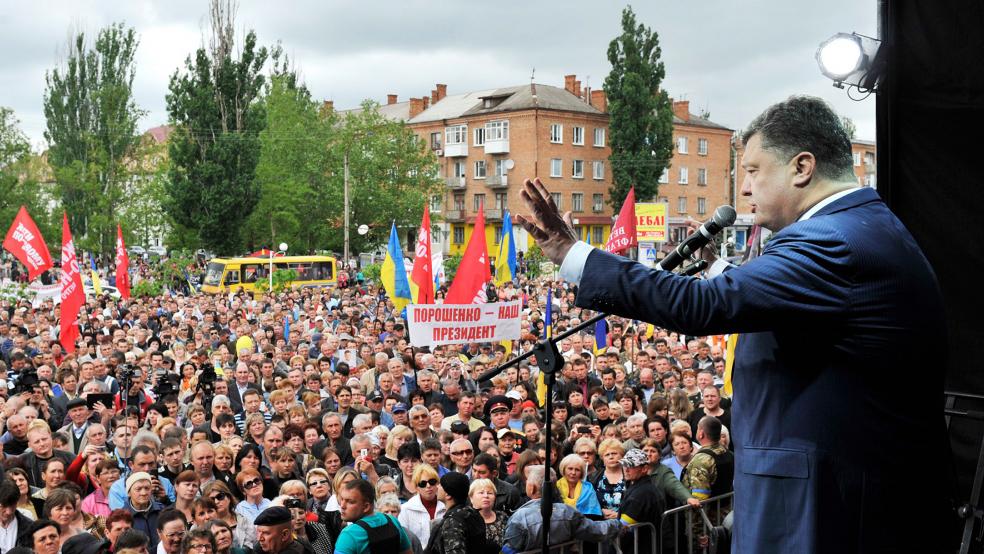Ukrainians take to the polls today in a presidential election that might be the most important European vote since the Berlin Wall fell 25 years ago.
Since pro-Russia President Viktor Yanukovich was forced from office by pro-Europe protestors in February, the country has become an international pawn in a chess game between the West and Russia, led by an emboldened President Vladimir Putin. With Yanukovich out of office, Russia annexed the Crimean peninsula, making it a de facto part of the Russian republic – while stoking pro-Russia protests in eastern Ukraine.
Related: Hang on…Has Obama’s Plan Stopped Putin After All?
The outcome of Sunday’s election in Ukraine – which Putin recently said he will respect – is likely to determine the new international order in Europe. If Ukraine decides to ally itself with Europe, it would reinforce the importance of European institutions such as NATO. However, if Ukrainians decide to ally themselves with Russia, European institutions that had maintained the post-Cold War order would fade in importance.
Polls show that most of the country favors a government with closer ties to Europe. However, across the country’s east, pro-Russian protestors have established strongholds that will likely be difficult to displace.
In Donetsk, a city where separatists have occupied government buildings for weeks, protestors who favor a closer relationship with Moscow have pledged to disrupt the election.
“There will be no presidential elections,” Roman Lyagin, an official from the newly declared and unrecognized Donetsk People’s Republic, told The New York Times. “An overwhelming majority of people don’t want them.”
Related: Putin’s Rise Highlights U.S. Descent from Global Stage
“Every stamp, down to the last one, is in our possession,” Lyagin told The Times, referring to presidential ballots.
Elsewhere in the country, though, hopes are growing that the election will be free and fair. In the run up to it, there was widespread fear that Putin would meddle in the election, or refuse to accept a result he didn’t like. Ahead of the election last week, the Russian president softened his stance.
“We understand and see that people in Ukraine want the country to come out of this lengthy crisis,” Putin told reporters in St. Petersburg. “We also want the situation to become calmer. We will respect the choice made by the people of Ukraine.”
At the same time, Putin accused the United States and the rest of its western allies of ironing Ukraine’s interests.
“Where is the guarantee that, after the forceful change of power, Ukraine will not tomorrow end up in NATO?" Putin told news reporters. "We hear only one answer, as if on a record: Every nation has a right to determine on its own the security system in which it wants to live, and that doesn't concern you.”
Related: Four Reasons Why Putin Pulled Back His Troops
Putin’s comments come as the Russian economy continues to suffer as a result of the instability of the Crimean invasion and the uncertainty in Ukraine. Even China, one of Russia’s most important allies, condemned the invasive action into Crimea. U.S. Secretary of State John Kerry and his European counterparts have warned of broader sanctions if Russia interferes in today’s contest, as did Vice President Joe Biden on Wednesday.
Outcome a Near Certainty
All of the drama surrounding the international politics of today’s vote overshadows the calm of Ukraine’s domestic affairs. Petro Poroshenko, a billionaire candy tycoon and veteran of Ukrainian politics, is favored to win more than 50 percent of the vote, negating the possibility of a run-off.
Poroshenko is so favored as the victor that he already appeared to be acting as Ukraine’s leader on Friday.
“Immediately after the recognition of the elections, we are ready for dialogue” with Moscow, Poroshenko said after a meeting with European leaders in Kiev.
He even threatened to seek NATO membership, a move that would enrage the Kremlin. “Who knows. maybe we should make this decision,” he said.
Top Reads from The Fiscal Times:
- House Republicans Propose Controversial Tax Vote
- Russia Can Lose Territory, Too. It Should Worry
- Russia’s Military Bear Is a Paper Tiger





